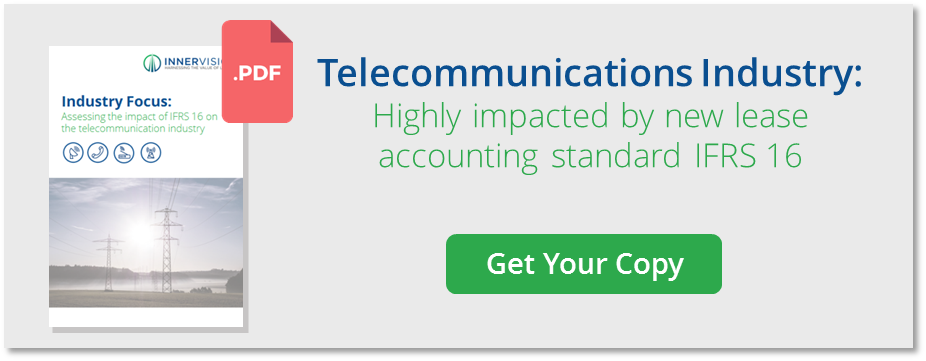Industry Focus: Assessing the Impact of IFRS 16 on the Telecommunications Industry
Updated 26th May 2021 | 4 min read Published 21st July 2016

The telecoms industry is connecting people all around the globe; they are also one of the most impacted sectors by the new lease accounting standard, IFRS 16.
Hans Hoogervorst, Chairman of the International Accounting Standards Board – one of the two boards who developed the new international standards – included telecommunications companies in his shortlist of industries that will likely see the biggest impact and have the most notable challenges when implementing IFRS 16. Our leasing experts have compiled this easy-to-follow, comprehensive guide on how telecoms businesses will be impacted and the steps they can take to be compliant, prepared and reduce the cost of transition to IFRS 16:
This short guide focuses on the unique compliance challenges facing telecoms entities, examines the immediate implications and offers a concise overview of IFRS 16 Leases with telecommunication specific examples.
The changes to international lease accounting guidelines have been a long time coming, with finalisation taking the best part of a decade. The new standard, named IFRS 16, aims to improve the clarity and comparability of the effects a lease’s underlying asset and liability has on financial statements by bring operating leases onto balance sheet.
As part of the transition, businesses will need to identify their current leases, a tedious complexity for companies as they will need to source and centralise information on all their leases across the company and fill in any data gaps that will most likely exist. This is a particularly complicated process for large companies that have numerous assets, of various types and sizes across the business.
Telecommunications entities will be particularly affected as those within the industry tend to lease a substantial number of big-ticket assets that are likely to be captured by the scope of IFRS 16, such as: network towers and equipment, satellite transponders and fibre optic cables.
HOW TELECOMMUNICATIONS ENTITIES WILL BE IMPACTED:
-
Significant number of operating leases in common
-
Large number of big ticket assets under lease
-
No current lease management system in place will complicate transition
-
Difficulty in identifying lease agreements due to common asset/contract types
-
Difficulty in separating lease and non-lease components of contracts
-
Various complex assets to identify
-
Numerous departments across many geographies makes it difficult to centralises all leases
-
Potentially significant impact on balance sheet and finance agreements
Research conducted by Deloitte indicates that, combined, the world’s largest 50 telecoms operators could potentially see as much as $125 billion of current operating lease commitment disclosures be added to balance sheets in respect of right-of-use assets.
Companies within the telecoms sector will be required to undertake an early impact and readiness assessment to determine the effect IFRS 16 will have on their financial performance, internal structures and develop a strategic plan for compliance. Additionally, telecoms companies will need to prudently manage their lease portfolio, identify lease renewals and use effective forecasting to communicate lease positions to key decision makers and stakeholders in light of the changes.
Of the $3.3 trillion of estimated lease commitments globally, a considerably significant 85% do not appear on balance sheets. Instead, they are accounting for within the footnotes of financial statements. This is because under existing lease accounting standards IAS 17, only finance leases need to be represented within the balance sheet; operating leases need not recognise arising assets and liabilities within financial statement calculations. This has led to confusion, inconsistency and complications for the users of financial statements, who must interpret balance sheets through self-made estimations and percentage denominators.
The deadline for IFRS 16 implementation is fast approaching and as more businesses recognise the scope of the new lease accounting standards and the true reality of the challenges ahead, entities are realising that they need to take proactive steps in order to meet the deadlines for compliance.
Spreadsheet accounting is not a suitable solution for the transition to IFRS 16, as highlighted by the large auditor firms. Many telecommunications entities are exploring the benefits of lease accounting software as the most cost effective way to centralise their leases, run the required internal and external accounting reports and improve their lease management efficiency and savings.
Lease accounting software will considerably reduce the burden of transitioning to IFRS 16 and provides many more lease management savings and reporting capabilities as well. To find out more about how lease accounting software is designed to improve your businesses leasing, click here to speak to one of our leasing experts about how to achieve compliance with savings.


